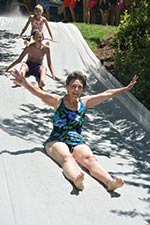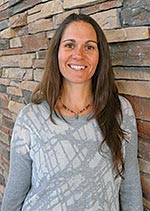Aging--The End Of Life As We Know It?
By Ray Andrew, MD
|
Every day it seems we meet at least one victim of the aging mentality. "I'm just getting old, Doc" is a lament we hear over and over. It doesn't help that patients routinely hear the same from their regular doctors when they present complaining of aches and pains, memory loss, and so forth. It's as if physical, emotional, and intellectual decline are expected consequences of adding birthdays to one's life.
Although a higher proportion of disabled people are older, something is wrong in our society when 40-year-olds rationalize their ailments by saying they're just getting older. Whether you're thirty or eighty, if you can't do the things you enjoy because you hurt, are too tired or depressed, can't think straight, or are too weak, you can't blame it on your age!
Blame it on bad habits; medications, pesticides, heavy metals, other toxins; unhealthy relationships; unfulfilling work; deficiencies of hormones, vitamins, minerals, amino acids, or fatty acids; or gut dysfunction. But not age. Chronological age does not confer debility.
In the Wellness Center, we focus on identifying and treating causes of decline in function rather than merely prescribing drugs to "manage" its symptoms. Ever heard of depression being caused by a Prozac deficiency? Sounds ridiculous but doctors prescribe antidepressants as if there really was such a deficiency.
 There are a number of reasons for society's heavy reliance on pharmaceutical drugs. From the doctor's perspective, it is easy to diagnose depression and prescribe an antidepressant, for example. We can do that in two minutes, pat you on the back and send you on your way, bill your insurance company a hundred bucks, and move on to the next patient. It is a lot more demanding to look at the causes of depression and suggest appropriate treatment options. Not only does it require studying a body of knowledge that was not part of our medical education, but it is also much more time-consuming and therefore less profitable. From the patient's perspective, it is easier to take a pill every day than to change one’s lifestyle, eat real food, and take supplements to address deficiencies. If counseling is needed, this can also be more time-consuming, expensive, and emotionally difficult than popping a pill. There are a number of reasons for society's heavy reliance on pharmaceutical drugs. From the doctor's perspective, it is easy to diagnose depression and prescribe an antidepressant, for example. We can do that in two minutes, pat you on the back and send you on your way, bill your insurance company a hundred bucks, and move on to the next patient. It is a lot more demanding to look at the causes of depression and suggest appropriate treatment options. Not only does it require studying a body of knowledge that was not part of our medical education, but it is also much more time-consuming and therefore less profitable. From the patient's perspective, it is easier to take a pill every day than to change one’s lifestyle, eat real food, and take supplements to address deficiencies. If counseling is needed, this can also be more time-consuming, expensive, and emotionally difficult than popping a pill.
Every day in the Wellness Center, we help people overcome the dysfunctions commonly blamed on aging. Our larger goal, however, is to prevent the "ravages" of aging—such as heart disease, diabetes, cancer, and osteoporosis—not react to them. Nowadays, people are less content to spend their remaining years in a rocking chair or nursing home. They recognize that fulfillment comes from productive work, volunteer service, teaching younger generations, cultivating talents and hobbies, spending time with loved ones, and engaging in recreation, sports, and travel.
Through no fault of their own, some are limited in what they can do as they get older. Disease, poverty, physician ignorance, and health policies prevent them from taking advantage of the technological advancements that make traditional aging a thing of the past. But given the right tools, some improvement is always possible. We are still able to help many people recover some function and pleasure in life even if they don’t see us until their eighties. However, those who choose to invest in their health decades earlier will benefit most from our services. Preservation is much less expensive than recovery or damage control.
So if you aren't interested in the traditional doom and gloom associated with getting older, now is the time to act. Come see us to find out how. "Old" doesn't have to be in your vocabulary if you know how to take care of your mitochondria. You can still work long into "retirement" because you find it rewarding; visit those great-grandchildren across the country; grow your own food; have the prettiest garden in town; have potluck dinners with your friends; build and fly your own airplane; go down the water slide in your backyard...or down the river with your grandchildren; and enjoy physical intimacy well into your "old age”. It's your choice.
Ray Andrew, MD, is a family physician with private practices in Moab and Springville, UT. He can be reached at (435) 259-4466 or www.moabfamilyhealth.com |
New Director of Hospice: Jessie Walsh R.N.
|
 Moab Regional Hospital has hired Jessie Walsh R.N. as the new Director of Hospice for Grand County Hospice. Grand County Hospice, provides comfort-oriented care and quality end-of-life to patients when end-of-life is expected within approximately six months. Walsh has worked at Moab Regional Hospital as a nurse for five years, and is excited to build the hospice volunteer program to utilize the many diverse talents and skills of the people in the community to support patients and their family members. Walsh said, “I am honored to be a part of Grand County Hospice, and to be a part of one of the most important times in people’s lives.” Moab Regional Hospital has hired Jessie Walsh R.N. as the new Director of Hospice for Grand County Hospice. Grand County Hospice, provides comfort-oriented care and quality end-of-life to patients when end-of-life is expected within approximately six months. Walsh has worked at Moab Regional Hospital as a nurse for five years, and is excited to build the hospice volunteer program to utilize the many diverse talents and skills of the people in the community to support patients and their family members. Walsh said, “I am honored to be a part of Grand County Hospice, and to be a part of one of the most important times in people’s lives.”
In addition to patient comfort, the goals of Grand County Hospice are to allow an individual to preserve their dignity, maintain their right of self-determination and allow the individual to remain in their home through the remainder of their life. Dealing with a terminal illness and facing end-of-life challenges can be a very confusing time for the patient and their family and friends. Many patients and families wait until the very end to seek hospice services, which can lead to pain and unnecessary stress for the patient and their family. Connecting with the services provided by Grand County Hospice early into a terminal diagnosis can help avoid crisis for both the patient and family.
Grand County Hospice consists of a team of specially trained individuals who work together to provide medical care and services, as well as helpful medical equipment, which promotes optimum quality of life and a sense of contentment for the patient and their families. The team of nurses, social workers, home health aides, volunteers, chaplains, and bereavement counselors visit the patient as often as needed, and are available 24 hours a day/7 days a week for support and care.
Volunteers are the heart of Grand County Hospice. For many people, end-of-life can be an isolating experience, and Grand County Hospice volunteers address this by bringing the community to the person’s home. They provide home visits to comfort the patients and the family, and a medical background is not necessary. Volunteers at Grand County Hospice find it personally gratifying and emotionally meaningful to assist those in need at this special point in their lives. If you are interested in getting involved with Grand County Hospice, the next volunteer training will be in November. Contact Grand County Hospice at 435-719-3772 for more information.
|
 There are a number of reasons for society's heavy reliance on pharmaceutical drugs. From the doctor's perspective, it is easy to diagnose depression and prescribe an antidepressant, for example. We can do that in two minutes, pat you on the back and send you on your way, bill your insurance company a hundred bucks, and move on to the next patient. It is a lot more demanding to look at the causes of depression and suggest appropriate treatment options. Not only does it require studying a body of knowledge that was not part of our medical education, but it is also much more time-consuming and therefore less profitable. From the patient's perspective, it is easier to take a pill every day than to change one’s lifestyle, eat real food, and take supplements to address deficiencies. If counseling is needed, this can also be more time-consuming, expensive, and emotionally difficult than popping a pill.
There are a number of reasons for society's heavy reliance on pharmaceutical drugs. From the doctor's perspective, it is easy to diagnose depression and prescribe an antidepressant, for example. We can do that in two minutes, pat you on the back and send you on your way, bill your insurance company a hundred bucks, and move on to the next patient. It is a lot more demanding to look at the causes of depression and suggest appropriate treatment options. Not only does it require studying a body of knowledge that was not part of our medical education, but it is also much more time-consuming and therefore less profitable. From the patient's perspective, it is easier to take a pill every day than to change one’s lifestyle, eat real food, and take supplements to address deficiencies. If counseling is needed, this can also be more time-consuming, expensive, and emotionally difficult than popping a pill.  Moab Regional Hospital has hired Jessie Walsh R.N. as the new Director of Hospice for Grand County Hospice. Grand County Hospice, provides comfort-oriented care and quality end-of-life to patients when end-of-life is expected within approximately six months. Walsh has worked at Moab Regional Hospital as a nurse for five years, and is excited to build the hospice volunteer program to utilize the many diverse talents and skills of the people in the community to support patients and their family members. Walsh said, “I am honored to be a part of Grand County Hospice, and to be a part of one of the most important times in people’s lives.”
Moab Regional Hospital has hired Jessie Walsh R.N. as the new Director of Hospice for Grand County Hospice. Grand County Hospice, provides comfort-oriented care and quality end-of-life to patients when end-of-life is expected within approximately six months. Walsh has worked at Moab Regional Hospital as a nurse for five years, and is excited to build the hospice volunteer program to utilize the many diverse talents and skills of the people in the community to support patients and their family members. Walsh said, “I am honored to be a part of Grand County Hospice, and to be a part of one of the most important times in people’s lives.”